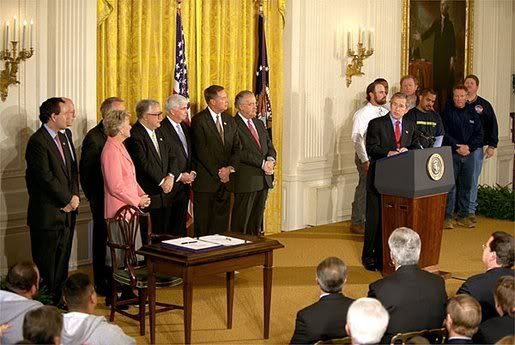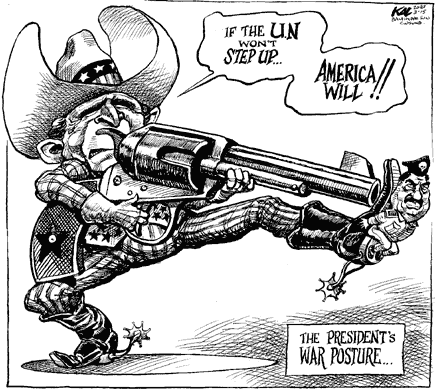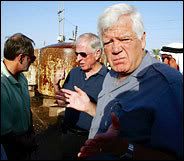
Bush: "The Terrorism Risk Insurance Act will provide coverage for catastrophic losses from potential terrorist attacks. Should terrorists strike America again, we have a system in place to address financial losses and get our economy back on its feet as quickly as possible."The Terrorist Risk Insurance Act (TRIA), creates a 3-year program requiring the federal government to pay 90% of terrorism-related claims that exceed $10 billion in 2003, $12.5 billion in 2004, and $15 billion in 2005.
[See below in boldface for names in photograph.]
THE PRESIDENT: Thank you all. Thank you. Good morning and welcome to the White House. Today we're taking action to strengthen America's economy, to build confidence with America's investors, and to create jobs for America's workers. The Terrorism Risk Insurance Act will provide coverage for catastrophic losses from potential terrorist attacks. Should terrorists strike America again, we have a system in place to address financial losses and get our economy back on its feet as quickly as possible.
With this new law, builders and investors can begin construction in real estate projects that have been stalled for too long, and get our hard-hats back to work. (Applause.)
I appreciate members of my Cabinet who are here who worked on this bill -- Paul O'Neill, and Don Evans and Elaine Chao. Thank you all for coming.
I appreciate the members of Congress who are here, particularly those on the stage with me who worked hard to get the bill passed -- Chairman Paul Sarbanes, Chris Dodd from Connecticut who did a lot of work to get the bill done. (Applause.) Senator Harry Reid worked hard on this piece of legislation, as well. I appreciate Chairman Mike Oxley from the House who also worked, along with Senator Dodd, to get this important piece of legislation passed. Mike, thank you for your leadership on this issue. (Applause.)
As well, we're joined by other key players from the House of Representatives, Sue Kelly, Chris Shays, John LaFalce, and Ken Bentsen. These members of Congress put the interests of the country ahead of partisanship, and as a result of their hard work I'm able to sign the bill today. I want to thank you for your leadership. (Applause.)
I also want to thank the union leaders who are here today, people with whom we've worked hard to get this done; leaders who put the interest of their membership right on the line -- Doug McCarron -- appreciate your leadership, Doug. He's the General President of the United Brotherhood of Carpenters and Joiners. Frank Hanley is the General President of the International Union of Operating Engineers, is with us today. Joe Hunt is the General President of the Iron Workers International Union. Ed Sullivan, who is the President of the Building and Construction Trades Department of the AFL-CIO; Terry O'Sullivan, who is the General President of the Laborers International Union of North America.
I appreciate the workers from the United Brotherhood of Carpenters and Joiners and Iron Workers, and the Building and Construction Trade Department of the AFL-CIO
, who are with us today representing thousands of people who are going to go back to work thanks to this piece of legislation. Thanks for your leadership, and thanks for your presence. (Applause.)
The attacks of September the 11th, 2001, devastated lives, leveled buildings and seriously, seriously disrupted our economy. Businesses suffered. The stock market halted trading. Many insurance companies stopped covering builders and real estate owners against the risk of attack. Premiums skyrocketed. Protections were diminished. Across America, hospitals and office buildings and malls and museums and construction jobs and many transportation companies have had difficulty finding terrorism insurance.
More than $15 billion in real estate transactions have been canceled or put on hold because owners and investors could not obtain the insurance protection they need. Commercial construction is at a six-year low, and thousands of hard-hat workers have been kept off the job. Commercial mortgage-backed securities have seen their bond ratings lowered, hurting many Americans invested in the bond market, including teachers and police officers and firefighters, who have lost money in their pension plans.
By helping to ensure that terrorism insurance is affordable and available, the Terrorism Risk Insurance Act will permit many construction projects to move forward and to help this economy grown. Billions of dollars in investments will be more secure. The nation's hard-hats will get back to work, being able to put food on the table for their families. Investors in markets will have greater confidence that our economy is strong enough to withstand a future attack. And that's important.
This new law will also help the economy in the legal system by discouraging abusive lawsuits. Civil cases resulting from a terrorist attack will be combined in a single federal court. Lawyers will be prevented from shopping for courts with a reputation for outrageous awards. Judgments and rulings will be more consistent.
It's important for our taxpayers to understand that taxpayer dollars will not be used to pay punitive damages. I'm grateful to the members of Congress who put the interest of the workers and taxpayers ahead of lawyers. I look forward to working with the new Congress on stronger measures to prevent abusive lawsuits. And today I'm taking steps to ensure that no taxpayer dollar will be spent on legal settlements without the approval of the Secretary of the Treasury. The Secretary will work to ensure that settlements are fair to victims, not windfalls for the legal class of America. The act of Congress I sign today will encourage greater competition in the insurance market and add strength to our economy.
But there's more to do. I'll work with Democrats and Republicans in the next Congress to pass a growth-in-jobs package early next year.
My administration is determined to make America safer, to make our economy stronger. And we're making progress on both fronts. America has entered a new kind of war, requiring aggressive action abroad and active defense at home. Yesterday I signed into law the new Department of Homeland Security, to organize our government for the long-term challenge of protecting America. Today, with terrorism insurance, we're defending America by making our economy more secure. Both these achievements show the unity of our nation in a time of testing, and our resolve to lead America to a better day.
I'm now pleased to sign the Terrorism Risk Insurance Act of 2002. (Applause.)
(The bill is signed.) (Applause.)
This bill has been knocking around Congress since 9/11/01.
On October 2, 2002, after the House passed a resolution authorizing Bush to use military force in Iraq, but before the Lieberman-Warner-Bayh-McCain resolution did the same thing in the Senate, Harry Reid took to the Senate floor. Reid apparently threw the American people under a bus, breaking the Senate's threat to rein in Bush by buying votes for Bush's war - Big business will not object to Bush's war (and the increased risk of new terrorist attacks on western corporations that result from it) IF the American taxpayer picks up the tab for the damage.
Filed under: Republicans, Democrats, Congress, John LaFalce, Terrorist Risk Insurance Act, TRIA, Mike Oxley, Chris Dodd, Paul Sarbannes, Ken Bentsen, Sue Kelly, Elaine Chao, Chris Shays, organized labor, union, war+in+Iraq, Harry Reid, hold them accountable, Bush, The Constant American, Constant American, Technorati Tag, Technorati Tags, tags, categories





